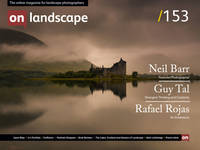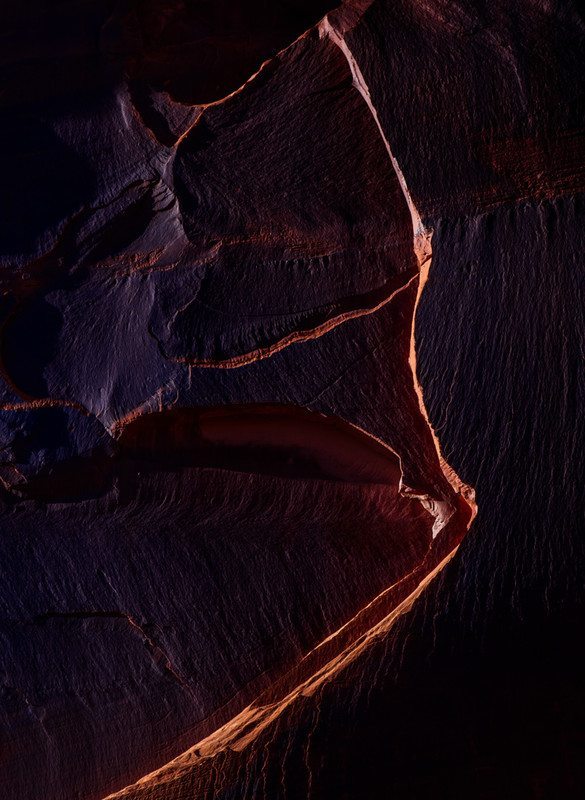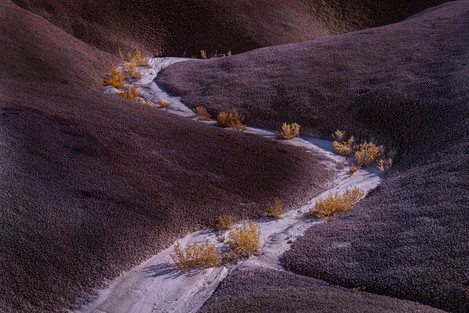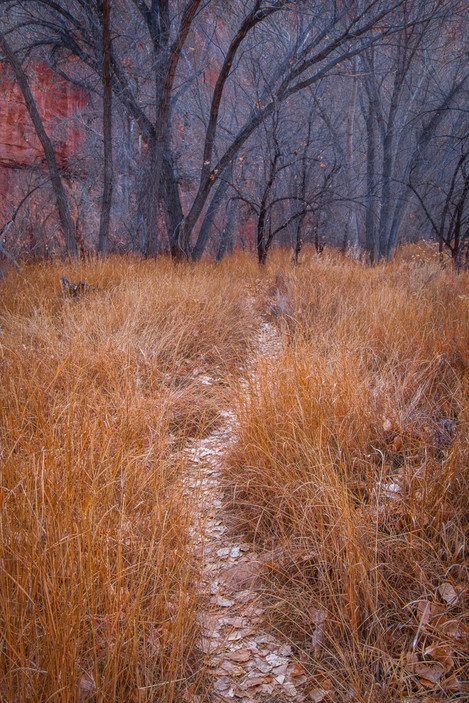Divergent Thinking, Creativity, and Why You Should Care
If a roomful of students all arrived at the identical (and demonstrably correct) answer to a math question, it would be exemplary. But if those same students answered an artistic question by producing a roomful of identical paintings, something would be terribly wrong. ~Ted Orland
"Do you like this image better in color or in black-and-white?" — a not uncommon question I sometimes receive from those I have yet to intimidate with my tendency to turn such questions into teaching (or, according to some, preaching) opportunities. My truthful response, albeit a bit snarky, is that by asking such a question the photographer has already made me like the image less than I might if he or she had already made the choice in accordance with their own sensibilities and a clear idea of how they wanted me to be affected by the image. This is because the question implies a greater concern for aesthetic appeal than for expressive intent, which is the quality I am most interested in.
What the photographer hoped to express in the image (or, conversely, the effect he or she hoped for the image to have on those who view it) is only knowable to the photographer. Without explicitly stating this intent, there is no way I could have answered the question in any meaningful way (i.e., beyond stating personal taste, which would be of no real value to the photographer) even if I wanted to. If the photographer had an expressive intent, this intent would have dictated the answer unambiguously, and a more relevant question for the viewer might have to do with the degree to which the expressive goal was accomplished
Admittedly, I am reluctant to answer questions about my aesthetic preferences because I wish to prompt photographers to transcend the simplistic thinking of images solely as aesthetic artifacts, lacking an ulterior, subjective, "message." For better or worse, such images — often described as "eye candy" — are so common and prevalent that to one who studies photographs day in and day out they are at best short-lived distractions. I believe wholeheartedly that a photographer wishing to advance beyond following the herd (literally and metaphorically) should aim to make the shift, as early as possible, from considering aesthetic appeal as the primary goal for an image, to treating aesthetics as components of a visual language — words and expressions making up a visual vocabulary: limited in meaning by themselves, but offering a limitless range of expression when combined and composed into more complex narratives.
Those who attended my workshops likely have heard me say, early on, that there is one correct answer to almost every question in photography, which is this: it depends.
Seemingly facetious, "it depends" actually is an answer I offer sincerely and with a clear goal, which is this: to encourage photographers to consider and employ what's known as divergent thinking — a trait so closely associated with creativity that some psychology texts treat them as synonymous. The term was coined in the 1950s by psychologist Joy Paul Guilford, who later evolved his analysis to correlate divergent thinking with creativity. Guilford's model for divergent thinking consists of four elements: fluency (the ability to come up with a large number of possible solutions to a given problem, without advance planning), flexibility (the ability to consider a wide range of possible solutions, rather than focusing on established patterns), originality (the ability to come up with novel and previously unknown solutions), and elaboration (the ability to convert a chosen solution form idea to practical implementation).
Guilford also distinguished divergent thinking from the more common convergent thinking, which is described by psychologist Mihaly Csikszentmihalyi as, "solving well-defined, rational problems that have one correct answer."
An important implication of differentiating convergent from divergent thinking is the now well-accepted assertion that creativity is not correlated with intelligence as measured in IQ tests (which, in fact, measure convergent thinking skills). A person may be considered exceptionally intelligent but still fail to find creative solutions and expression if he or she does not possess some of the traits identified as conducive to divergent thinking, some of which are: curiosity, nonconformity, persistence (sometimes referred to as "grit"), and willingness to take risks.
Of course, simply answering "it depends" is of little use if one does not also articulate what, specifically, the answer depends on. In the case of the color-versus-black-and-white question, my answer may be: it depends on the mood you wish to express; or: it depends on whether these specific colors contribute to or distract from what you wish for the viewer to feel. Certainly, in some cases, the photographer may not have an immediate answer to such questions because he or she did not consider them, allowing their attention to be consumed by the aesthetic appeal of the subject, light, or composition (or, much worse, pressure to conform and to please others). But, it is likely that once presented with such questions the photographer will consider them from that point onward, and hopefully also find a way to answer his or her own question better than anyone else could.
At the core of divergent thinking is entering into a situation whose outcome is not known or determined in advance. At the point of decision, a good divergent thinker will (deliberately or intuitively) consider as many possible outcomes as he or she can come up with and choose the best option from among these in real time. It is easy to see how such an approach is correlated (to the point of almost being synonymous) with creativity, which is commonly defined as the production of novel and useful products. When an outcome is pre-determined, the product indeed may be useful (i.e., serve an intended purpose) but it cannot be considered novel. It follows that photographers who are in the habit of carefully planning their productions, having a clear expectation of what images they will come back with from a trip and how they will go about producing these images, are, by definition, not creative.
When asked what I will photograph on a given outing, my answer is always this: I won't know until I get there, and I don't want to know. I don't want to stand in my own way toward making creative work. As psychologist Erich Fromm put it, "Creativity requires the courage to let go of certainties."
It's fair to ask why one should be concerned about whether their images are creative or not, or why one should risk the possibility of divergent thinking coming up empty when convergent thinking (planning, sticking to well-vetted formulae, etc.) has a better chance of yielding a result that may not be creative but that may still satisfy in some way. Certainly, relying on divergent thinking can be detrimental to productivity, as explained by the late Oliver Sacks:
"Why is it that of every hundred gifted young musicians who study at Juilliard or every hundred brilliant young scientists who go to work in major labs under illustrious mentors, only a handful will write memorable musical compositions or make scientific discoveries of major importance? Are the majority, despite their gifts, lacking in some further creative spark? Are they missing characteristics other than creativity that may be essential for creative achievement — such as boldness, confidence, independence of mind? It takes a special energy, over and above one's creative potential, a special audacity or subversiveness, to strike out in a new direction once one is settled. It is a gamble as all creative projects must be, for the new direction may not turn out to be productive at all."
The short answer is that creative expression (accomplished by way of divergent thinking) is shown to be strongly correlated with a sense of meaning in life. And, all else aside, it is more important to me to feel that my life is meaningful than to please or impress others.
Granted, the answer also may differ based on whether one must rely on making photographs as a means for earning a living (dictating a less risk-tolerant approach) or as a means for creative expression. Then again, there is no reason why the same person may not pursue the safety of convergent thinking in their professional endeavors but also allow himself or herself the freedom and benefits of divergent thinking when pursuing photography for self-edification.
To put a finer point on the benefits of divergent thinking, psychologist Mihaly Csikszentmihalyi offers two reasons why creativity is an important source of meaning in life. The first reason (an objective one) is this: "most of the things that are interesting, important, and human are the results of creativity." I suspect that this reason will not satisfy most. Let's be honest, not many of us would choose to make our photography less productive and more challenging out of a sense of civic duty. The second reason (a subjective one) is this: "when we are involved in it [creativity], we feel that we are living more fully than during the rest of life. The excitement of the artist at the easel or the scientist in the lab comes close to the ideal fulfillment we all hope to get from life, and so rarely do."
If the potential to experience "the ideal fulfilment we all hope to get from life, and so rarely do" is not reason enough to risk the possibility of returning from an otherwise rewarding experience without making a photograph, then what is?








